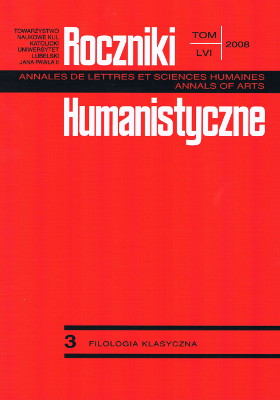Man towards Passing and Transitory Nature of the Moment in Marcus Aurelius’ Meditations
Abstract
In his Meditations, the emperor-Stoic Marcus Aurelius very often goes back to the motive of passing and transitory nature of human life. On the one hand this permanent and pessimistic motive may be interpreted as a certain kind of spiritual exercises, practised not only by Stoics. On the other hand we cannot exclude that they are a manifestation of the author’s personal views and experiences. Marcus often touched upon the topic of death, a fact that was not an expression of his fear before what was inevitable, especially that according to the Stoic doctrine death belongs to the immutable order of the world and is compatible with nature, hence it is completely acceptable. Marcus Aurelius is afraid rather of the transitory nature of the moment given to us to be used. He stresses that life “is running down” each day and at the same time he is tormented with the lack of time that must be filled with good and respectable behaviour, with life in conformity with the orders of reason, or the deity. Marcus Aurelius is not frightened by death itself, but the possibility to lose control over one’s life, loss of consciousness, and the ability to reflect (in the case of a illness or old age). He also stresses firmly the importance of favours that we may and should render to others, for despite the proper shape of one’s soul this is the goal of human life.
References
Copleston F.: Historia filozofii, t. 1: Grecja i Rzym, tłum. H. Bednarek, Warszawa 1998.
Dodds E. R.: Pogaństwo i chrześcijaństwo w epoce niepokoju, przeł. J. Partyka, Kraków 2004.
Gajda J.: Sofiści, Warszawa 1989.
Grimal P.: Marek Aureliusz, tłum. A. Łukaszewicz, Warszawa 1997.
Guthrie W. K. C.: The Sophists, Cambridge 19887 .
Hadot P.: Czym jest filozofia starożytna?, tłum. P. Domański, Warszawa 2000.
Hadot P.: Filozofia jako ćwiczenie duchowe, tłum. P. Domański, Warszawa 1992.
Hadot P.: La Citadelle intérieure. Réflexions sur Marc-Aurèle, Paris 1992.
Jaeger W.: Teologia wczesnych filozofów greckich, Kraków 2007.
Krokiewicz A.: Zarys filozofii greckiej, Warszawa 2000.
Narecki K.: Logos we wczesnej myśli greckiej, Lublin 1999.
Rist J. M.: Stoic Philosophy, Cambridge 1969.
Reale G.: Historia filozofii starożytnej, t. IV: Szkoły epoki cesarstwa, tłum E. I. Zieliński, Lublin 1999.
Sandbach F. H.: The Stoics, London 1975.
Whitrow G. J.: Czas w dziejach, tłum. B. Orłowski, Warszawa 2004.
Copyright (c) 2008 Roczniki Humanistyczne

This work is licensed under a Creative Commons Attribution-NonCommercial-NoDerivatives 4.0 International License.





